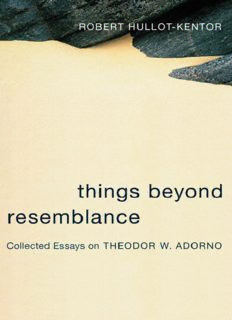
Things Beyond Resemblance: Collected Essays on Theodor W. Adorno PDF
Preview Things Beyond Resemblance: Collected Essays on Theodor W. Adorno
things beyond resemblance COLUMBIA THEMES IN PHILOSOPHY, SOCIAL CRITICISM, AND THE ARTS COLUMBIA THEMES IN PHILOSOPHY, SOCIAL CRITICISM, AND THE ARTS Lydia Goehr and Gregg M. Horowitz, editors Advisory Board J. M. Bernstein Eileen Gillooly Noël Carroll Thomas S. Grey T. J. Clark Miriam Bratu Hansen Arthur C. Danto Robert Hullot-Kentor Martin Donougho Michael Kelly David Frisby Richard Leppert Boris Gasparov Janet Wolff Columbia Themes in Philosophy, Social Criticism, and the Arts presents monographs, essay collections, and short books on philosophy and aesthetic theory. It aims to publish books that show the ability of the arts to stimulate critical reflection on modern and contemporary social, political, and cultural life. Art is not now, if it ever was, a realm of human activity independent of the complex realities of social organization and change, political authority and antagonism, cultural domination and resistance. The possibilities of critical thought embedded in the arts are most fruitfully expressed when addressed to readers across the various fields of social and humanistic inquiry. The idea of philosophy in the series’ title ought to be understood, therefore, to embrace forms of discussion that begin where mere academic expertise exhausts itself, where the rules of social, political, and cultural practice are both affirmed and challenged, and where new thinking takes place. The series does not privilege any particular art, nor does it ask for the arts to be mutually isolated. The series encourages writing from the many fields of thoughtful and critical inquiry. ROBERT HULLOT-KENTOR Collected Essays things beyond resemblance on THEODOR W. ADORNO COLUMBIA UNIVERSITY PRESS NEW YORK Columbia University Press Publishers Since 1893 New York Chichester, West Sussex cup.columbia.edu Copyright © 2006 Columbia University Press All rights reserved E-ISBN 978-0-231-51003-5 Library of Congress Cataloging-in-Publication Data Hullot-Kentor, Robert. Things beyond resemblance : collected essays on Theodor W. Adorno / Robert Hullot-Kentor. p. cm.—(Columbia themes in philosophy, social criticism, and the arts) Includes bibliographical references and index. ISBN 0-231-13658-7 (alk. paper) 1. Adorno, Theodor W., 1903–1969. I. Title. B3199.A34H85 2006 193—dc22 2006017599 A Columbia University Press E-book. CUP would be pleased to hear about your reading experience with this e-book at cup- [email protected]. Pour Odile Contents Acknowledgments Introduction: Origin Is the Goal Back to Adorno Things Beyond Resemblance The Philosophy of Dissonance: Adorno and Schoenberg Critique of the Organic: Kierkegaard and the Construction of the Aesthetic Second Salvage: Prolegomenon to a Reconstruction of Current of Music Title Essay: Baroque Allegory and “The Essay as Form” What Is Mechanical Reproduction? Adorno Without Quotation Popular Music and “The Aging of the New Music” The Impossibility of Music Apple Criticizes Tree of Knowledge: A Review of One Sentence Right Listening and a New Type of Human Being Ethics, Aesthetics, and the Recovery of the Public World Suggested Reading: Jameson on Adorno Introduction to T.W. Adorno’s “The Idea of Natural-History” The Idea of Natural-History Theodor W. Adorno Notes Index Acknowledgments IT IS A PLEASURE to express my gratitude to Rolf Tiedemann, Tom Huhn, Mowry Baden, Robert Kaufman, and Richard Leppert for their friendship and for their help over the years with these many essays and to Martin Jay as well, alias g.K and sine qua non. The author also acknowledges the kind permission from the following publishers to reprint, in some cases in revised form, “Things Beyond Resemblance,” in Theodor W. Adorno, Philosophy of New Music (Minnesota: University of Minnesota, 2006); “Second Salvage,” in Cultural Critique 60 (2005): 134–169; “Right Listening and a New Type of Human Being,” in RES: Anthropology and Aesthetics, no. 44 (2003): 191–198; “Adorno Without Quotation,” in RES: Anthropology and Aesthetics, no. 45 (2004): 5–10; “Ethics, Aesthetics, and the Recovery of the Public World,” as “Past Tense,” in The Recovery of the Public World, ed. Charles Watts and Edward Byrne (Vancouver: Talon, 1999), pp. 365– 372; “The Philosophy of Dissonance: Adorno and Schoenberg,” in Semblance of the Subject, ed. Thomas Huhn and Lambert Zuidervart (Cambridge: MIT Press, 1997), pp. 309–320; “Suggested Reading,” in Telos 89 (1993): 167–177; “Apple Criticizes Tree of Knowledge,” as “Beckett Up to Date,” Telos 92 (1993): 192; “The Impossibility of Music,” in Telos 87 (1991): 97–117; Popular Music and Adorno’s “The Aging of the New Music,” in Telos 77 (1989): 79–94; “Back to Adorno,” in Telos 81 (1989): 5–29; “Critique of the Organic,” in Theodor W. Adorno, Kierkegaard: Construction of the Aesthetic (Minnesota: University of Minnesota, 1989), pp. x–xxiii; “Introduction to ‘The Idea of Natural- History,’” in Telos 57 (1985): 111–124; Theodor W. Adorno, “The Idea of Natural-History,” trans. Robert Hullot-Kentor in Telos 57 (1985): 97–110; “Title Essay,” in New German Critique 32 (1984): 141–150.
Description: